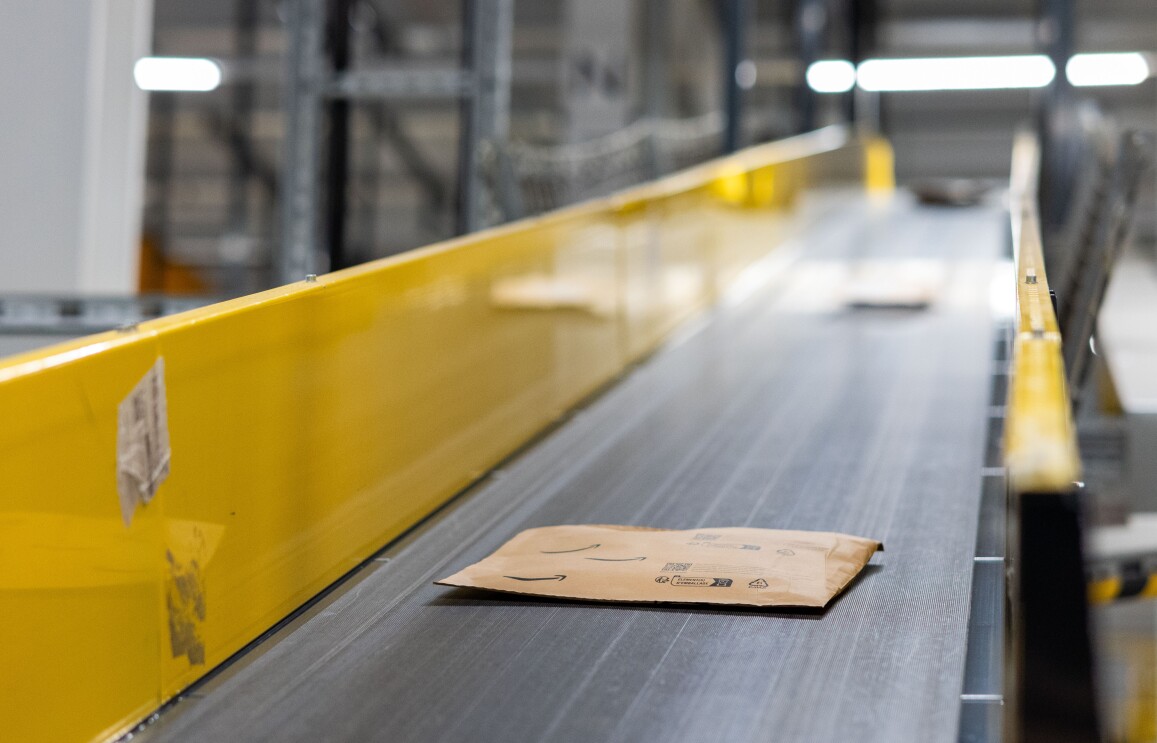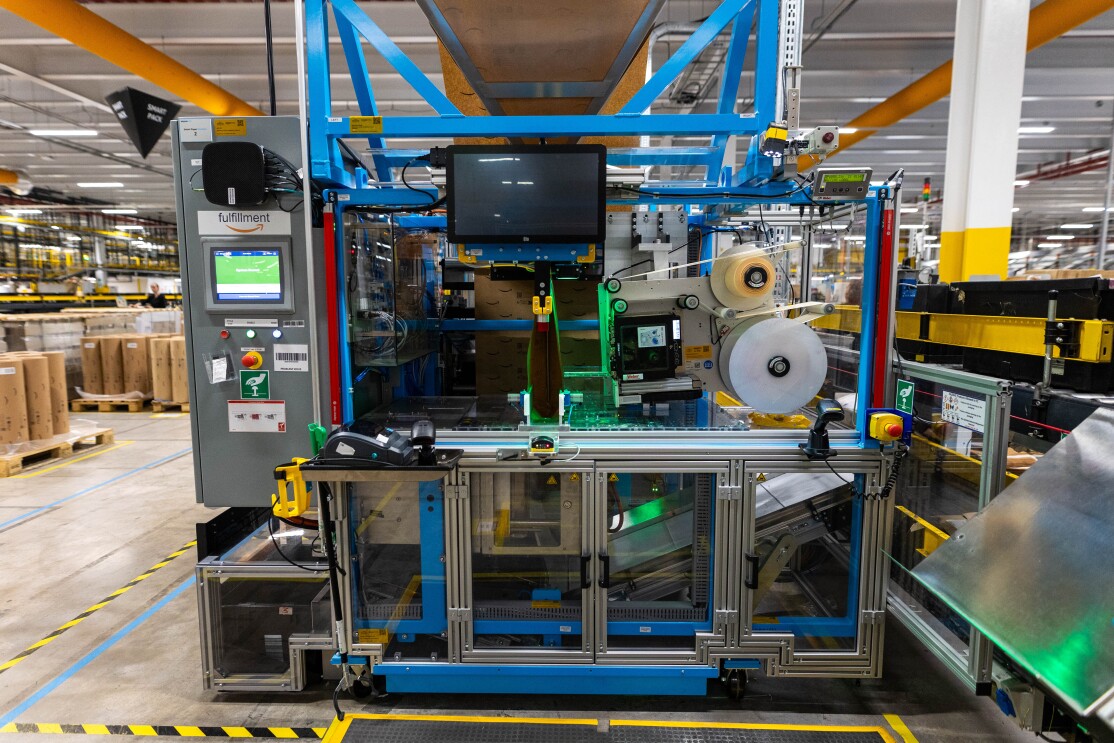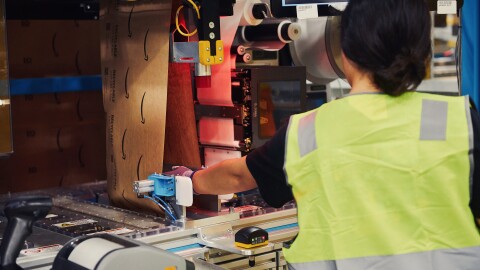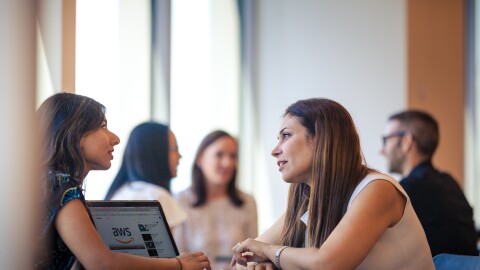We’re trialling new packaging machines in Europe and the US that build made-to-fit paper bags around individual items on demand, reducing the volume of packaging for thousands of everyday items. Using an in-built sensor, the machines scan items such as video games, kitchen gadgets, sports equipment, and office supplies – each of which were previously sent in boxes and cardboard folders – and then cut the paper bag from rolls of paper in real time, in order to pack the items securely. Each bag is secured using heat-sealing technology, enabling the machines to pack quickly and accurately, while minimising empty space around the contents. No glue is needed to seal the packaging, which further reduces resource usage. By packing items in 100% recyclable light paper packaging, which is made-to-fit without the need for padding, the machines help to avoid more than 26 grams of packaging per shipment, on average. Lightweight paper bags used by Amazon are up to 90% lighter than similar-sized cardboard boxes.
Our packaging engineers came up with this technology by redesigning machines that previously made plastic packages. The original machines were decommissioned when we stopped packing items in single-use plastic delivery bags at Amazon fulfilment centres across Europe.
Materials innovation

Paper Padded Envelopes: We’re testing a new recyclable paper-padded envelope across Europe. The envelope is optimised for weight, flexibility, and impact resistance. It’s critical for light-weight deliveries, since it’s much lighter than cardboard envelopes and boxes, making it easier to fill, and requires less carbon to manufacture and transport it. When packages are the right size, we can fit more of them in every van, leading to fewer van journeys, which in turn helps us with our goal to be net-zero carbon by 2040. Paper-padded envelopes can be disposed of in household recycling.
Bio-based and Biodegradable bags: While we work hard to reduce plastic packaging material, there are a few instances where customers may still receive products in plastic packaging, such as preparation materials like bubble wrap and bags to protect customer orders in specific weather conditions. To find alternatives that are both waterproof and flexible enough for e-commerce deliveries, our scientists continue to support the innovation of new, lower-carbon materials.
With the help of Novamont, an Italian-based biomaterials company that is part of Versalis (Eni), we’re piloting the use of innovative bags made of bio-based and biodegradable materials in Italy and Spain. In this project, we use bio-based raw materials obtained from sources such as starch and vegetable oils, which can be produced sustainably in Europe. Customers can place these bags in their local compostable waste collection streams or compost them at home, as the materials are certified to be both industrially and home compostable. The materials can also be recovered through recycling. Together with Novamont, we’re testing new models to collect these bags from customers and recycle them using mechanical and advanced recycling technologies. New technologies mean it’s possible to turn old bio-based bags into new bags indefinitely. We’re trialling these bags in different parts of the business in order to learn about the performance of this type of material in different applications.

New recycling technologies: Along with P&G, Henkel, l’Oréal and PepsiCo and others, we’re a member of HolyGrail 2.0, an industry-wide initiative to assess whether invisible digital watermarks on packaging can result in better sorting and recycling for packaging. Digital watermarks are imperceptible codes applied to packaging design – similar to a QR code – that are invisible to the human eye, but which digital scanners can “read” to retrieve information identifying the packaging material. It then separates it into the right recycling stream. We have also joined GO!PHA, a coalition to find alternative solutions to plastics for packaging, working with other brands and suppliers.
Reusable packaging
We’re also testing reusable packaging bags in the UK and France. The bags are designed to be durable and sealed with Velcro, so they can be reused multiple times. Customers are invited to return the reusable delivery bags for free, which feature the message: “I’m reusable, please return me” on them. This new packaging is robust enough for us to clean it and use it again and again.
We’ve joined the Ellen MacArthur Foundation’s Scaling Return Advisory Group, whose purpose is to convene key stakeholders to look into how to design and scale returnable packaging systems of the future. We’re also partnering with Reposit, a collaborative platform for FMCG products sold through traditional retail and e-commerce, in a cross-industry group to accelerate the transition from single-use packaging to reuse.
Scaling current programmes
Since 2015, our packaging reduction programmes have enabled us to avoid more than 2 million tons of packaging materials, around 950 times the weight of the UK's London Eye. A big part of this effort is our Ships in Product Packaging programme (SIPP), which involves manufacturers sending us products in packaging designed for e-commerce. This programme allows us to work with selling partners to ship products in their own branded product packaging without any additional Amazon packaging needed for delivery. We’ve run a pilot programme with selected sellers, gathering feedback to build a programme that better fits their needs. In 2024 the programme will be available to all sellers who use Fulfilment by Amazon (FBA).












